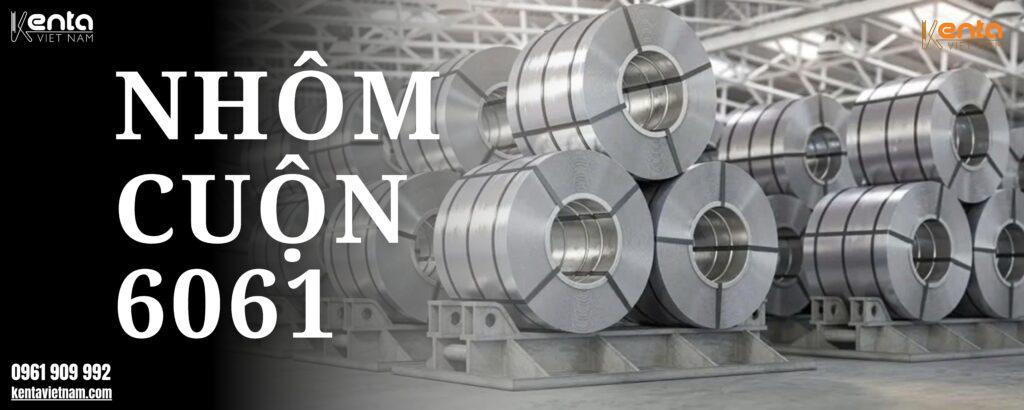Knowledge, Technology
6061 aluminum coil is a versatile alloy for high-tech engineering and industrial applications.
6061 aluminum coil is one of the most popular aluminum alloys in industry due to its balance of strength, machinability, and heat treatability. 6061 aluminum coil meets the needs for lightweight structures, automotive parts, aluminum frames, and precision engineering components. This article provides an in-depth analysis of the composition, mechanical properties, manufacturing process, and guidance on selecting 6061 aluminum coil for industrial projects.
Alloy nature and chemical properties
6061 aluminum coil belongs to the Al–Mg–Si alloy group, where silicon and magnesium combine to form Mg₂Si phases that enhance material strength after heat treatment. This composition allows 6061 aluminum coil to significantly increase strength through T6 or T651 treatments, resulting in higher yield strength and tensile strength compared to many other 6xxx alloys. At the micro level, the size and distribution of Mg₂Si phases directly affect mechanical properties and fatigue resistance.
Mechanical properties and behavior during heat treatment
When treated to the T6 condition, 6061 aluminum coil exhibits a good balance of strength and ductility, allowing parts to withstand dynamic loads and achieve excellent surface finishes. In the T651 condition, after stress relief and flattening, the material maintains dimensional stability, suitable for parts requiring high tolerances. Mechanical properties such as yield strength, elastic modulus, and fatigue strength must be verified on the Mill Test Certificate (MTC) for each batch before product design.
Manufacturing process of 6061 aluminum coil and quality control
6061 aluminum coil is produced from standard alloy ingots through hot rolling, cold rolling, and controlled heat treatment. During this process, the factory continuously measures thickness, flatness, and checks composition by spectroscopy to ensure uniformity. Batches leaving the factory are usually accompanied by a Mill Test Certificate and mechanical test report, helping designers rely on actual data to calculate safety factors and tolerances.
Tolerance control and traceability
Flatness, thickness tolerance, and residual stress levels in the coil are closely monitored. This ensures that when put into processing—especially for precision assembly parts—no dimensional errors or uncontrolled warping occur. As an experienced supplier, Kenta Vietnam always requests and checks the MTC before delivery to reduce risks for processing factories.
Machinability and forming technology
6061 aluminum coil has good machinability by cutting, bending, turning, and CNC milling. However, when cutting, attention should be paid to speed and tools because this alloy is harder than 1xxx or 3xxx alloys. Precision milling on 6061 aluminum requires proper lubrication and cooling to avoid thermal deformation. The weldability of 6061 is also stable with MIG/TIG processes but often requires pre-weld and post-weld treatment techniques to avoid strength reduction in the heat-affected zone.
Typical industrial applications
6061 aluminum coil is used for structural frames, fan blades, guide components, machine housings, and high-precision parts. In the automotive and aerospace industries, this alloy often appears in parts that require moderate load-bearing capacity but demand light weight. The flexibility of 6061 aluminum coil also makes it suitable for mold components, cover plates, and frame structures for industrial machinery.
Selecting 6061 for different working environments
In environments with chloride or sea salt, careful consideration is needed because Al–Mg alloys (such as 5xxx) have better natural surface corrosion resistance. When designing parts with 6061 aluminum coil, evaluating the working environment, dynamic load frequency, and welding requirements is a mandatory step to select the appropriate material condition and surface protection measures.
Surface optimization and corrosion protection treatment
6061 aluminum coil can be anodized to increase surface hardness and improve corrosion resistance. Applying PVDF coating or electrostatic paint helps extend outdoor application life and UV resistance. For welded parts, additional surface treatment will protect the joint area from electrochemical corrosion and extend the component's lifespan.
Using 6061 aluminum coil helps reduce structural weight,fuel efficiency and reduce operating costs. This alloy also has an advantage in its recyclability, contributing to the company's sustainable development strategy. The combination of technical performance and environmental benefits makes 6061 aluminum coil a strategic choice for modern projects.
Supply and Consulting Services from Kenta Vietnam
Kenta Vietnam Technical Co., Ltd. provides 6061 aluminum coil with a Mill Test Certificate, supports sample testing, and offers consultation on heat treatment, processing, and suitable surface protection methods. Kenta partners with reputable manufacturers to supply a diverse range of coil sizes and processing conditions, while also supporting quality inspection after handover to optimize lifetime costs for customers.
6061 aluminum coil is a versatile material that meets the requirements for strength, processing, and surface finish in many industries. Choosing 6061 aluminum coil that suits the specific project and working with a capable supplier like Kenta Vietnam will help ensure technical and economic efficiency.
————
KENTA VIETNAM – QUALITY BUILDS TRUST
![]() Main office: No. 22, Phung Cong service area, Phung Cong Commune, Hung Yen province
Main office: No. 22, Phung Cong service area, Phung Cong Commune, Hung Yen province
![]() Warehouse No. 1: Ngo Yen Hamlet, Hong An Ward, Hai Phong City (at the foot of Kien Bridge)
Warehouse No. 1: Ngo Yen Hamlet, Hong An Ward, Hai Phong City (at the foot of Kien Bridge)
![]() Warehouse No. 2: No. 22, Phung Cong service area, Phung Cong Commune, Hung Yen province
Warehouse No. 2: No. 22, Phung Cong service area, Phung Cong Commune, Hung Yen province
![]() Phone: 0972 887 106 – 0961 909 992
Phone: 0972 887 106 – 0961 909 992
![]() Email: contact@kentavietnam.com
Email: contact@kentavietnam.com
![]() Website: kentavietnam.com
Website: kentavietnam.com




















